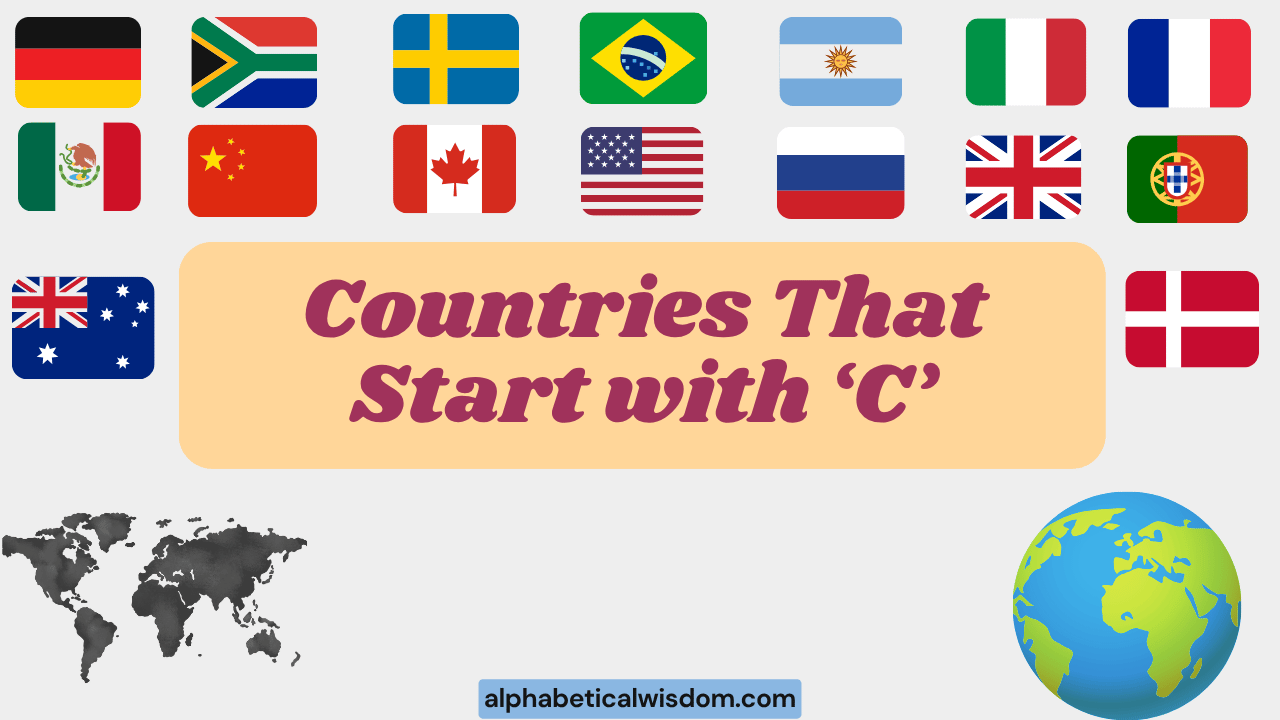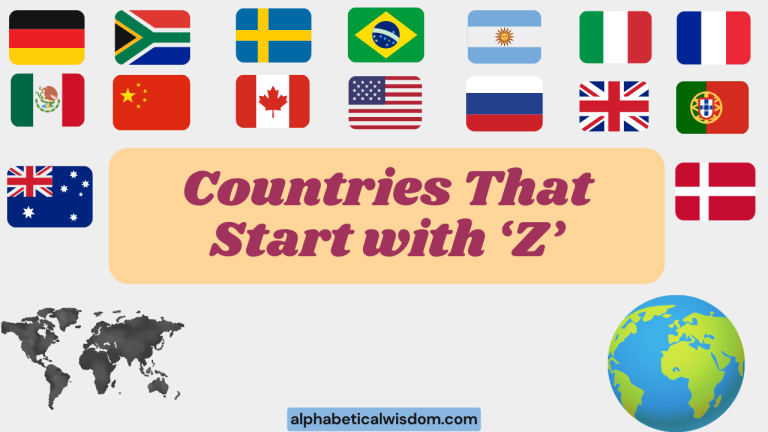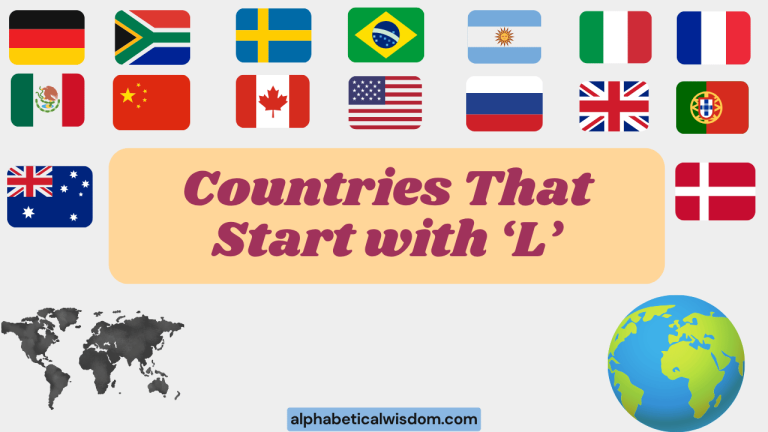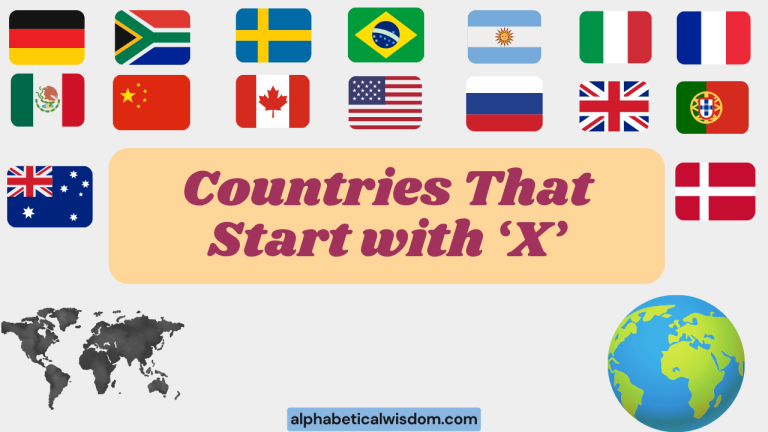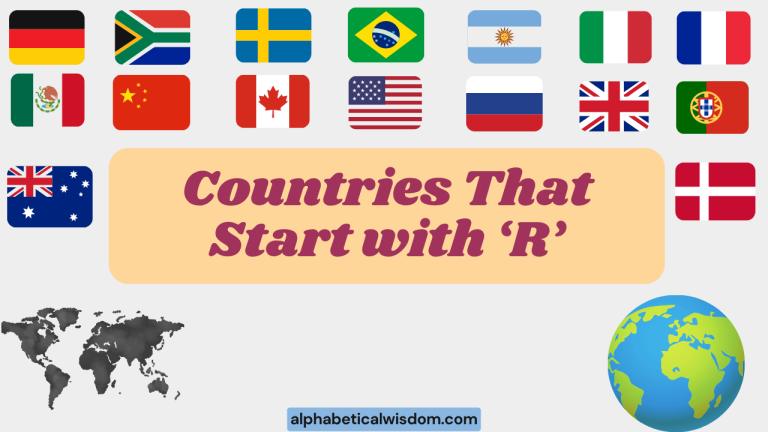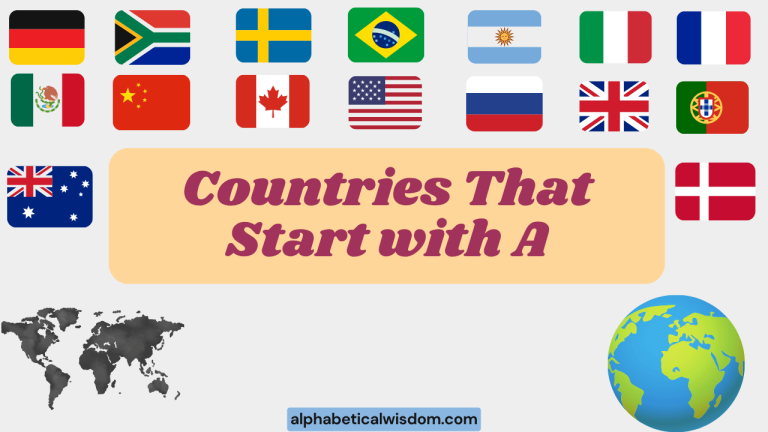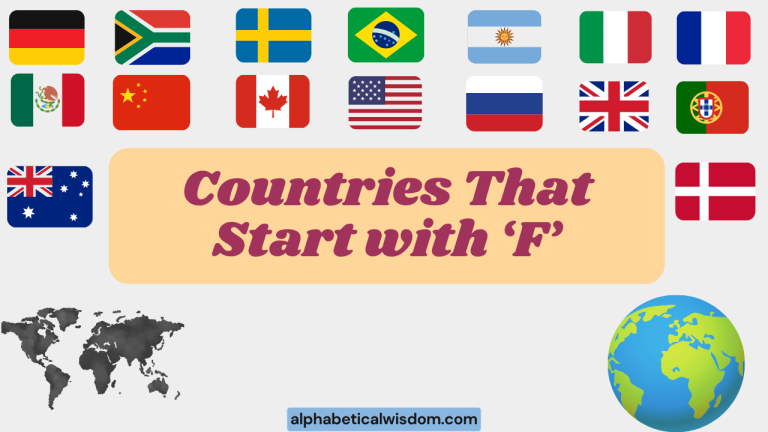Countries Starting With ‘C’: Grammar & Usage Guide
Understanding how to correctly use country names, especially those starting with the letter ‘C,’ is crucial for clear and accurate communication in English. This includes knowing when to use articles, understanding noun types (proper vs. common), and applying correct grammatical structures in sentences.
Whether you are an ESL learner, a student studying geography, or simply someone looking to improve their English skills, this guide will provide a comprehensive overview of the grammar rules and usage associated with countries that begin with ‘C’. This knowledge will help you write and speak with greater confidence and precision.
Table of Contents
- Definition: Countries Starting With ‘C’
- Structural Breakdown
- Types and Categories
- Examples
- Usage Rules
- Common Mistakes
- Practice Exercises
- Advanced Topics
- FAQ
- Conclusion
Definition: Countries Starting With ‘C’
A country, in the context of this article, refers to a sovereign state, a self-governing political entity that possesses a defined territory and a permanent population, and is recognized as independent by other states. This article focuses specifically on countries whose names begin with the letter ‘C’. These names function as proper nouns, which are specific names of people, places, or things, and are always capitalized in English. Understanding that these are proper nouns is essential for correct capitalization and grammatical usage. Countries starting with ‘C’ include, but are not limited to, Canada, Chile, China, Colombia, Costa Rica, Croatia, Cuba, Cyprus, Czech Republic, and Côte d’Ivoire. Each country has its own unique grammar considerations related to its official name and associated adjective of nationality.
The function of a country name within a sentence is typically that of a subject, object, or prepositional object. For example, in the sentence “Canada is a large country,” “Canada” is the subject. In “I visited Costa Rica last year,” “Costa Rica” is the object. And in “The culture of Croatia is fascinating,” “Croatia” is the prepositional object within the prepositional phrase “of Croatia.” The context in which the country name is used will dictate the specific grammatical role it plays.
Structural Breakdown
The structural elements of using country names in English revolve around their classification as proper nouns. As proper nouns, they require capitalization, regardless of their position in the sentence. The structure also involves understanding how these names interact with articles (the, a, an) and prepositions (in, to, from). For instance, we say “I am from Canada” (no article) but “I visited the Czech Republic” (with the article ‘the’). The use of articles often depends on the specific country name and historical conventions. Furthermore, the formation of adjectives of nationality is also crucial. For example, the adjective for Canada is “Canadian,” for Chile it is “Chilean,” and for China it is “Chinese”. These adjectives modify nouns to indicate origin or association with the country.
Understanding the possessive form is also important. To show possession, we typically add an apostrophe and ‘s’ to the country’s name: “Canada’s economy,” “China’s history.” However, for some country names, especially those ending in ‘s’, the possessive form can be simply an apostrophe: “Cyprus’ beaches“. The context and style guide often dictate the preferred form. The ability to correctly structure sentences with these elements is fundamental to clear and grammatically correct writing and speaking.
Types and Categories
Sovereign States
Sovereign states are independent and self-governing entities recognized by international law. These are the primary focus when discussing countries.
Examples include Canada, Chile, China, Colombia, Costa Rica, Croatia, Cuba, Cyprus, Czech Republic, and Côte d’Ivoire. Each of these countries possesses its own government, territory, and population, and engages in diplomatic relations with other countries.
The use of these names in sentences follows the general rules of proper nouns, as previously discussed. It’s important to note that the official name of a sovereign state may sometimes differ from its common name, which can affect article usage (e.g., the Czech Republic vs.
Czechia).
Dependent Territories (If Applicable)
While this article primarily focuses on sovereign states, it’s worth mentioning that dependent territories exist. These are territories that are under the jurisdiction of another country.
As these are not sovereign states, they are not the main focus, but understanding their distinction is important. For example, some islands may be dependencies of larger nations.
When referring to dependent territories, it’s crucial to specify their relationship to the governing country to avoid confusion.
Historical Entities (If Applicable)
Historical entities refer to countries that existed in the past but no longer exist in their original form or have been dissolved. While not directly relevant to the current list of countries starting with ‘C’, it’s important to understand that geographical and political landscapes change over time.
Referring to historical entities requires careful attention to historical context and accuracy. The grammatical rules for using their names are similar to those for current countries, but the tense of the verbs used in sentences about them should reflect their past existence.
Examples
General Use in Sentences
This section provides examples of how countries starting with ‘C’ are used in general sentences. These examples illustrate the basic grammatical function of country names as subjects, objects, and in prepositional phrases.
| Country | Example Sentence |
|---|---|
| Canada | Canada is known for its vast landscapes. |
| Chile | I have always wanted to visit Chile. |
| China | China’s economy has grown rapidly in recent decades. |
| Colombia | Coffee from Colombia is highly regarded. |
| Costa Rica | Costa Rica is a popular ecotourism destination. |
| Croatia | The coastline of Croatia is stunning. |
| Cuba | I enjoyed my trip to Cuba. |
| Cyprus | Cyprus is an island nation in the Mediterranean. |
| Czech Republic | The Czech Republic is famous for its beer. |
| Côte d’Ivoire | Côte d’Ivoire is a major producer of cocoa. |
| Canada | She lives in Canada. |
| Chile | The mountains in Chile are beautiful. |
| China | He is learning Mandarin, the official language of China. |
| Colombia | They exported flowers from Colombia. |
| Costa Rica | We are planning a vacation to Costa Rica. |
| Croatia | The history of Croatia is rich and complex. |
| Cuba | The music from Cuba is very lively. |
| Cyprus | The beaches of Cyprus attract many tourists. |
| Czech Republic | The capital of the Czech Republic is Prague. |
| Côte d’Ivoire | The economy of Côte d’Ivoire relies heavily on agriculture. |
Use with Adjectives
This table illustrates how adjectives are used to describe countries, often referring to nationality or origin.
| Country | Adjective | Example Sentence |
|---|---|---|
| Canada | Canadian | I admire Canadian politeness. |
| Chile | Chilean | We enjoyed the Chilean wine. |
| China | Chinese | She is studying Chinese culture. |
| Colombia | Colombian | Colombian coffee is world-renowned. |
| Costa Rica | Costa Rican | He is a Costa Rican citizen. |
| Croatia | Croatian | We learned some Croatian phrases. |
| Cuba | Cuban | She loves Cuban music. |
| Cyprus | Cypriot | The Cypriot cuisine is delicious. |
| Czech Republic | Czech | He speaks Czech fluently. |
| Côte d’Ivoire | Ivorian | The Ivorian economy is developing. |
| Canada | Canadian | The Canadian government is located in Ottawa. |
| Chile | Chilean | She is wearing a Chilean sweater. |
| China | Chinese | He ordered Chinese takeout. |
| Colombia | Colombian | They visited a Colombian coffee plantation. |
| Costa Rica | Costa Rican | The Costa Rican rainforest is very diverse. |
| Croatia | Croatian | She studied Croatian literature. |
| Cuba | Cuban | He is a big fan of Cuban cigars. |
| Cyprus | Cypriot | The Cypriot people are very friendly. |
| Czech Republic | Czech | She is learning to cook Czech food. |
| Côte d’Ivoire | Ivorian | The Ivorian president gave a speech. |
Use in Complex Sentences
Complex sentences combine independent and dependent clauses. This table shows how country names can be integrated into more complex grammatical structures.
| Country | Example Sentence |
|---|---|
| Canada | Although Canada is known for its cold winters, it has beautiful summers. |
| Chile | Because I love mountains, I really want to visit Chile. |
| China | Since China has a large population, its cultural diversity is immense. |
| Colombia | If you enjoy coffee, you should try some from Colombia. |
| Costa Rica | Costa Rica, which is known for its biodiversity, is a popular tourist destination. |
| Croatia | After visiting Croatia, I understood why it’s a popular vacation spot. |
| Cuba | While Cuba has a unique history, it also has a vibrant culture. |
| Cyprus | Cyprus, where ancient ruins are abundant, attracts many history enthusiasts. |
| Czech Republic | Before I visited the Czech Republic, I didn’t appreciate European architecture. |
| Côte d’Ivoire | Because Côte d’Ivoire is a major cocoa producer, its economy is heavily influenced by cocoa prices. |
| Canada | Even though Canada is geographically large, its population density is relatively low. |
| Chile | Because Chile is located in South America, it has a diverse range of climates and landscapes. |
| China | As China continues to grow economically, its influence on global affairs increases. |
| Colombia | Since Colombia has made great strides in security, it has become more attractive to tourists. |
| Costa Rica | Because Costa Rica is committed to environmental conservation, it is a leader in ecotourism. |
| Croatia | If you plan to visit Croatia, you should explore its beautiful islands. |
| Cuba | Although Cuba has faced economic challenges, its culture remains vibrant and resilient. |
| Cyprus | Because Cyprus is strategically located in the Mediterranean, it has a rich and complex history. |
| Czech Republic | Before the Czech Republic joined the European Union, it underwent significant economic reforms. |
| Côte d’Ivoire | While Côte d’Ivoire has experienced political instability, it remains a key player in the West African economy. |
Use in Questions
This section provides examples of how to use country names in question form.
| Country | Example Question |
|---|---|
| Canada | Have you ever been to Canada? |
| Chile | What is the capital of Chile? |
| China | How many people live in China? |
| Colombia | Is Colombia safe to visit? |
| Costa Rica | What is the best time to visit Costa Rica? |
| Croatia | Where is Croatia located? |
| Cuba | What is the currency of Cuba? |
| Cyprus | What languages are spoken in Cyprus? |
| Czech Republic | Have you ever visited the Czech Republic? |
| Côte d’Ivoire | What is Côte d’Ivoire known for? |
| Canada | Are there mountains in Canada? |
| Chile | What is the climate like in Chile? |
| China | Does China have a large military? |
| Colombia | Is Colombia known for its coffee production? |
| Costa Rica | Can you see sloths in Costa Rica? |
| Croatia | Is Croatia a member of the European Union? |
| Cuba | What kind of music is popular in Cuba? |
| Cyprus | Is Cyprus divided? |
| Czech Republic | What is Prague, in the Czech Republic, famous for? |
| Côte d’Ivoire | Which language is spoken in Côte d’Ivoire? |
Use in Comparisons
Comparing countries helps to illustrate their unique characteristics and differences. This table provides examples of comparative sentences.
| Country | Example Sentence |
|---|---|
| Canada vs. Chile | Canada is much colder than Chile. |
| China vs. Costa Rica | China has a much larger population than Costa Rica. |
| Croatia vs. Cuba | Croatia is more accessible to European tourists than Cuba. |
| Czech Republic vs. Cyprus | The Czech Republic has a continental climate, while Cyprus has a Mediterranean climate. |
| Côte d’Ivoire vs. Colombia | Côte d’Ivoire is primarily an agricultural economy, whereas Colombia has a more diversified economy. |
| Canada vs. China | Canada has a lower population density than China. |
| Chile vs. Croatia | Chile is located in South America, while Croatia is in Europe. |
| Costa Rica vs. Cuba | Costa Rica is more environmentally focused than Cuba. |
| Cyprus vs. Côte d’Ivoire | Cyprus is an island nation, whereas Côte d’Ivoire is a mainland country. |
| Czech Republic vs. Colombia | The Czech Republic is part of the European Union, while Colombia is not. |
| Canada vs. Chile | The cost of living in Canada is higher than in Chile. |
| China vs. Costa Rica | The culture of China is older than the culture of Costa Rica. |
| Croatia vs. Cuba | The currency in Croatia is different from the currency in Cuba. |
| Czech Republic vs. Cyprus | The history of the Czech Republic is longer than the history of Cyprus. |
| Côte d’Ivoire vs. Colombia | Côte d’Ivoire is located in Africa, while Colombia is located in South America. |
| Canada vs. China | The size of Canada is larger than the size of China, but China has a much larger population. |
| Chile vs. Croatia | Chile has a longer coastline than Croatia. |
| Costa Rica vs. Cuba | Costa Rica has more biodiversity than Cuba. |
| Cyprus vs. Côte d’Ivoire | Cyprus is closer to Europe than Côte d’Ivoire. |
| Czech Republic vs. Colombia | The Czech Republic is a landlocked country, while Colombia has coastlines on both the Atlantic and Pacific Oceans. |
Usage Rules
Capitalization
The most fundamental rule is that all country names, being proper nouns, must be capitalized. This applies regardless of where they appear in a sentence. Incorrect capitalization can lead to confusion and appear unprofessional. For example, writing “canada” instead of “Canada” is grammatically incorrect.
Remember that even parts of a country’s official name must be capitalized. For example, “the Czech Republic” requires both “Czech” and “Republic” to be capitalized. Consistent and correct capitalization is crucial for maintaining clarity and grammatical accuracy.
Articles (The vs. No Article)
The use of the definite article “the” before a country’s name can be tricky. Generally, most country names do not require an article.
However, there are exceptions. Countries with plural names (e.g., the Netherlands), those that are unions or republics (e.g., the Czech Republic), or those with descriptive names often take “the.”
For example, you would say “I visited Canada” but “I visited the Czech Republic.” There are exceptions, and learning these requires memorization and practice. Using the wrong article can sound awkward or incorrect to native English speakers. Always refer to reliable grammar resources when unsure.
Possessive Form
To show possession or association, we typically add an apostrophe and ‘s’ to the country’s name. For example, “Canada’s economy is strong” indicates that the economy belongs to or is associated with Canada. However, if a country’s name ends in ‘s’, there are two acceptable forms: adding just an apostrophe (Cyprus’ beaches) or adding an apostrophe and ‘s’ (Cyprus’s beaches). Both are grammatically correct, but consistency is key. Choose one style and stick to it throughout your writing.
The possessive form is not only used for literal possession but also for describing characteristics or attributes of the country. For example, “China’s history is rich and complex” indicates that the history is a defining aspect of China.
Adjectives of Nationality
Each country has a corresponding adjective of nationality, which is used to describe people, things, or ideas originating from that country. These adjectives are also capitalized. For example, the adjective for Canada is “Canadian,” for Chile it is “Chilean,” and for China it is “Chinese.” These adjectives are used to modify nouns, such as “Canadian culture,” “Chilean wine,” and “Chinese food.”
It’s important to use the correct adjective form, as incorrect usage can sound unnatural or be confusing. Learning the adjective forms for each country is essential for accurate and fluent English communication.
Some adjectives follow predictable patterns, while others are irregular, so memorization is often necessary.
Common Mistakes
One common mistake is incorrect capitalization. For example, writing “i want to visit canada” is incorrect. The correct form is “I want to visit Canada.” Another frequent error is using the wrong article. Saying “I went to Czech Republic” is incorrect; it should be “I went to the Czech Republic.”
Another common error is using the incorrect adjective of nationality. For example, saying “I like China food” is incorrect. The correct form is “I like Chinese food.” Finally, misusing the possessive form is also frequent. Saying “Canadas economy” is incorrect. The correct form is “Canada’s economy.”
Here’s a table illustrating common mistakes:
| Incorrect | Correct | Explanation |
|---|---|---|
| i want to visit canada. | I want to visit Canada. | Capitalization error: Country names are proper nouns and must be capitalized. |
| I went to Czech Republic. | I went to the Czech Republic. | Article omission: Some country names require the article “the.” |
| I like China food. | I like Chinese food. | Incorrect adjective: Use the correct adjective of nationality. |
| Canadas economy is strong. | Canada’s economy is strong. | Possessive form error: Use the correct possessive form with an apostrophe. |
| The chile flag is red, white, and blue. | The Chilean flag is red, white, and blue. | Incorrect adjective form. |
| He is from costa rica. | He is from Costa Rica. | Missing capitalization. |
| She visited the cuba last year. | She visited Cuba last year. | Unnecessary article. |
Practice Exercises
Exercise 1: Fill in the Blanks
Fill in the blanks with the correct country name.
| Question | Answer |
|---|---|
| The capital of ______ is Ottawa. | Canada |
| ______ is known for its coffee production. | Colombia |
| Prague is the capital of ______. | the Czech Republic |
| ______ is an island nation in the Caribbean. | Cuba |
| Santiago is the capital of ______. | Chile |
| ______’s economy is growing rapidly. | China |
| ______ is famous for its beautiful coastline. | Croatia |
| ______ is known for its ecotourism. | Costa Rica |
| ______ is a divided island nation. | Cyprus |
| Yamoussoukro is the capital of ______. | Côte d’Ivoire |
Exercise 2: Correct the Errors
Identify and correct the errors in the following sentences.
| Incorrect Sentence | Correct Sentence | Explanation |
|---|---|---|
| i want to go to chile. | I want to go to Chile. | Capitalization error. |
| she is from the canada. | She is from Canada. | Unnecessary article. |
| he speaks czech language. | He speaks Czech. | Correct adjective form. |
| costa ricas beaches are beautiful. | Costa Rica’s beaches are beautiful. | Possessive form and capitalization. |
| The china is a large country. | China is a large country. | Incorrect article usage. |
| The capital of croatia is Zagreb. | The capital of Croatia is Zagreb. | Missing capitalization. |
| The cuba has a unique culture. | Cuba has a unique culture. | Unnecessary article. |
| He visited cyprus last summer. | He visited Cyprus last summer. | Missing capitalization. |
| I love the colombia coffee. | I love Colombian coffee. | Incorrect adjective and article usage. |
| the côte d’ivoire is in africa. | Côte d’Ivoire is in Africa. | Unnecessary article and capitalization. |
Exercise 3: Sentence Construction
Construct sentences using the given country and a provided word.
| Country | Word | Example Sentence |
|---|---|---|
| Canada | Maple | Canada is famous for its maple syrup. |
| Chile | Mountains | The mountains in Chile are stunning. |
| China | Tea | China is the origin of tea. |
| Colombia | Emeralds | Colombia is known for its emeralds. |
| Costa Rica | Rainforest | Costa Rica has a beautiful rainforest. |
| Croatia | Islands | Croatia has many beautiful islands. |
| Cuba | Cigars | Cuba is famous for its cigars. |
| Cyprus | Beaches | Cyprus has beautiful beaches. |
| Czech Republic | Beer | The Czech Republic is known for its beer. |
| Côte d’Ivoire | Cocoa | Côte d’Ivoire is a major producer of cocoa. |
Advanced Topics
Idiomatic Expressions
Idiomatic expressions involving country names are relatively rare, but they can provide insights into cultural perceptions. For example, there might be phrases that use “China” to refer to something of high quality or complexity, or “Canada” to represent peace and diplomacy.
However, it’s important to note that these expressions can be culturally specific and may not translate well across different contexts. Exploring these idiomatic expressions can provide a deeper understanding of the cultural significance of these countries.
Understanding these expressions requires familiarity with cultural and historical contexts. Idioms often carry nuanced meanings that are not immediately apparent from the literal words used.
Learners should consult reliable sources and engage with native speakers to fully grasp the meaning and usage of these expressions.
Historical and Cultural Context
The historical and cultural context of each country significantly influences how its name is used and perceived. For example, understanding the history of the Czech Republic is essential for appreciating its cultural heritage and political landscape.
Similarly, knowing about China’s long and complex history is crucial for understanding its current global role. Each country’s unique historical trajectory shapes its identity and influences how it is represented in language and culture.
Exploring historical events, cultural traditions, and social norms can provide valuable insights into the nuances of language use. Learners should strive to develop a broad understanding of the historical and cultural context of each country to enhance their communication skills and avoid misunderstandings.
Political Nuances
Political nuances can also affect how country names are used. For example, referring to “Taiwan” as a separate country from “China” can be a politically sensitive issue.
Similarly, using the term “Côte d’Ivoire” instead of its English translation, “Ivory Coast,” is politically preferred by the Ivorian government. Being aware of these political sensitivities is essential for respectful and accurate communication.
Political landscapes are constantly evolving, and it’s important to stay informed about current events and diplomatic relations. Learners should be mindful of the potential implications of their language choices and strive to use respectful and appropriate terminology.
FAQ
-
Why do some country names require the article “the” while others don’t?
The use of “the” before a country name often depends on historical and grammatical factors. Countries that are unions, republics, or have plural names (e.g., the Czech Republic, the Netherlands) typically require “the.” There’s no single rule, so it’s best to learn these exceptions individually.
-
How do I form the possessive of a country name ending in ‘s’?
For country names ending in ‘s’ (e.g., Cyprus),
you can add either an apostrophe (‘) or an apostrophe and an ‘s’ (‘s). Both “Cyprus’ beaches” and “Cyprus’s beaches” are correct, but it’s best to choose one style and use it consistently.
-
Are adjectives of nationality always capitalized?
Yes, adjectives of nationality (e.g., Canadian, Chilean, Chinese) are always capitalized because they are derived from proper nouns (country names).
-
Is it okay to use the English translation of a country name instead of its official name?
In most cases, using the English translation is acceptable. However, some countries, like Côte d’Ivoire, officially prefer that their name not be translated. It’s always a good practice to be aware of these preferences and respect them.
-
How can I improve my knowledge of country-related vocabulary and grammar?
Reading news articles, travel blogs, and academic texts can help you become more familiar with how country names are used in different contexts. Additionally, practicing sentence construction and error correction exercises can reinforce your understanding of grammar rules.
Conclusion
Understanding the grammar and usage rules for countries starting with ‘C’ is essential for effective communication in English. By mastering capitalization, article usage, possessive forms, and adjectives of nationality, you can express yourself with greater accuracy and confidence.
Remember to pay attention to common mistakes and practice regularly to reinforce your knowledge. Furthermore, exploring advanced topics such as idiomatic expressions, historical context, and political nuances can deepen your understanding and appreciation of the cultural significance of these countries.
With consistent effort, you can enhance your language skills and communicate more effectively in a globalized world.
